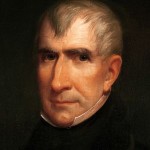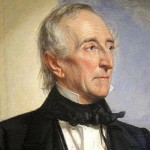 On April 4, 1841 William Henry Harrison became the first United States president to die in office. The Constitution did not address critical questions regarding succession and the status of Harrison’s Vice-President, John Tyler. Tyler would act to resolve one of the issues, apparently for personal, not constitutional reasons.
On April 4, 1841 William Henry Harrison became the first United States president to die in office. The Constitution did not address critical questions regarding succession and the status of Harrison’s Vice-President, John Tyler. Tyler would act to resolve one of the issues, apparently for personal, not constitutional reasons.
Lack of Constitutional Clarity
The Constitution’s succession provision lacks clarity on several points. The presidential succession provision of Article II is:
“In Case of the Removal of the President from Office, or of his Death, Resignation, or Inability to discharge the Powers and Duties of the said Office, the Same shall devolve on the Vice President, and the Congress may by Law provide for the Case of Removal, Death, Resignation or Inability, both of the President and Vice President, declaring what Officer shall then act as President, and such Officer shall act accordingly, until the Disability be removed, or a President shall be elected.”
This clause does not define a presidential inability to discharge his powers and duties. The vice-president’s status if the president is removed, dies or resigns is not designated. Would the vice-president become president, or be only Acting President?
Powers and Duties Shall Devolve on the Vice-President
The Constitution does not say the vice-president shall become president, but rather the president’s powers shall devolve on the vice-president. The definition of devolve is: “to pass (responsibility, power, etc.) from one person or group to another person or group at a lower level of authority.”[1]
Vice-Presidency: A Constitutional Afterthought
The Constitution says little about the vice-presidency. The job was a constitutional afterthought to solve a problem with the presidential Electoral College system.
The Constitutional Convention delegates were concerned that with only the office of president, all electors would vote for a favorite son from their state. If that happened, then the electoral system would always be in chaos. They created a second office and gave each elector two votes, requiring one vote to be for a candidate from another state as a solution.[2]
With the Electoral College runner-up becoming vice-president, each elector’s second vote was equally important. The vice-presidency was created not to fulfill a government function but rather to ensure the integrity of the presidential vote.
The vice-president was given only two specific jobs: to preside over the Senate and to discharge the powers and duties of the president if the president was unable to serve. These limited duties have been the source of criticism over the years, much of it from vice-presidents.[3]
 Tyler Delays Taking Presidential Oath
Tyler Delays Taking Presidential Oath
When Harrison died on April 4th, Tyler was not in Washington, but at home in Virginia. Tyler learned of Harrison’s death at sunrise on April 5th. As a presidential death had never before happened and the Constitution was unclear as to the vice-president’s status Tyler did not take the presidential oath immediately.[4]
Tyler’s originally took the position that his oath as vice-president was sufficient for him to execute the duties and powers of president. This position was consistent with the view that the vice-president would be acting as president. With that view, a presidential oath was unnecessary, as the vice-president would be fulfilling the constitutional duties assigned to his office.
Was There a Difference in Being President Rather Than Acting as President?
Tyler’s thinking on the subject was certainly plausible. As a practical matter, was there a real difference between being Vice-President Acting as President and being President? With the presidential powers and duties having devolved upon the vice-president, he could sign or veto laws, command the military and exercise every other presidential power. The legal authority did not vary with the title.
There was one very significant difference. In 1841, the presidential salary was $25,000. The vice-presidential salary was $5,000. Should Tyler actually BE President, his pay would increase fivefold. There was the difference.
John Tyler Changes His Mind and Takes the Presidential Oath
Two days after President Harrison died, on April 6, 1841, John Tyler took the presidential oath of office. Afterward, he insisted he was the president, not acting as president. His decision was controversial, but eventually in June, 1841 the House and Senate passed resolutions recognizing Tyler’s claim to the presidency.
Tyler’s action resolved a constitutional ambiguity by precedent alone until the 25th Amendment resolved the issues clearly. Given Tyler’s previous public position on the matter, it is fair to say he did it for the pay raise.
[1]The Merriam-Webster Online Dictionary.
[2]There were other problems with this complex system that required the 12th Amendment to resolve.
[3]John Nance Garner, Franklin Roosevelt’s Vice-President from 1933-1941 has had perhaps the most famous and memorable commentary on the job as being “not worth a bucket of warm spit.”
[4]This would change in the future. Abraham Lincoln died at 7:22 AM April 15, 1865, and Andrew Johnson was sworn in at 10 AM. When Calvin Coolidge was informed of President Harding’s death, he took the oath of office at his father’s home at 2:47 AM on August 3, 1923. President Kennedy was pronounced dead at 1 PM on November 23, 1963 and Lyndon Johnson took the presidential oath at 2:38 PM.





